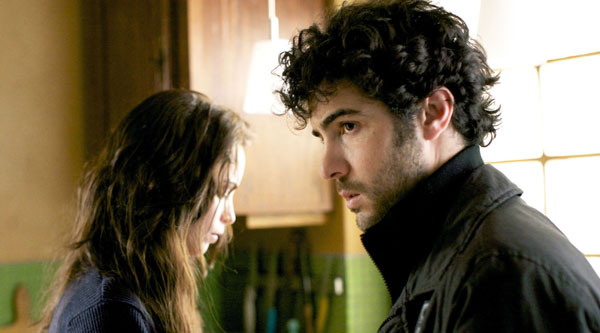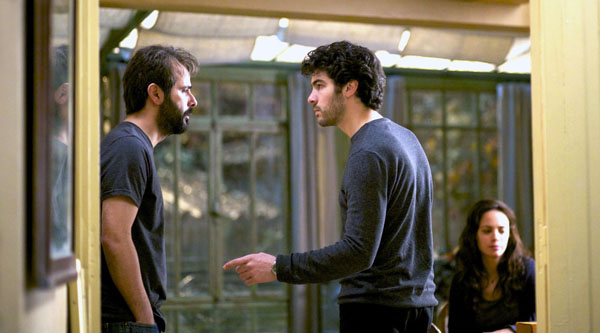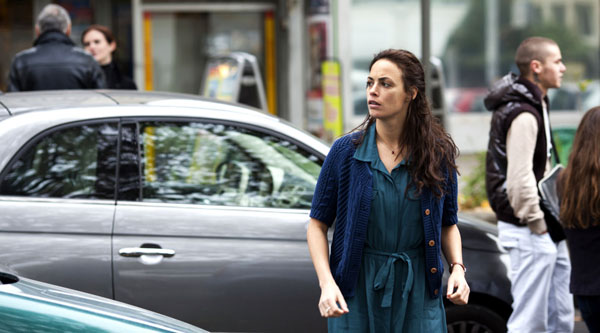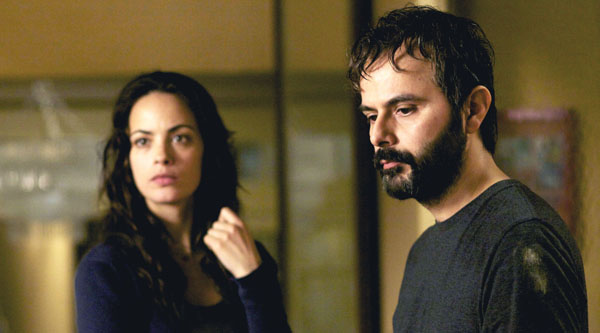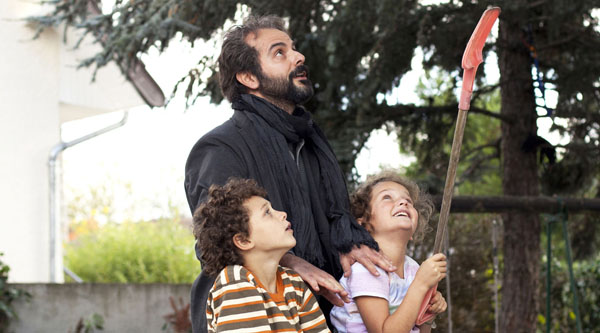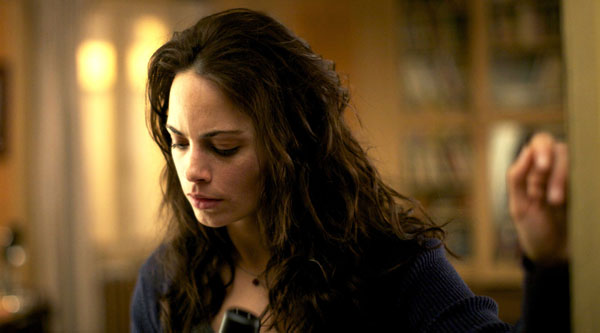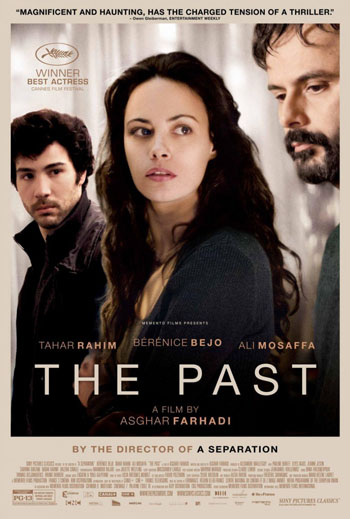“The Iranian filmmaker Asghar Farhadi has come to Cannes with an absorbing, fascinating if slightly contrived movie, a loss-of-love-triangle starring Bérénice Bejo, Ali Mosaffa and Tahar Rahim,” begins the Guardian‘s Peter Bradshaw. “A Frenchwoman, Marie (Bejo), is attempting to resolve difficulties with her Iranian husband, Ahmad (Mosaffa), from whom she has been long separated, and to make a fresh start with a new partner, Samir (Rahim). The film revisits some themes of Asghar’s breakthrough film A Separation, about the mortality of love, along with ideas about intimacy and domesticity in a world where the stepfamily is the norm. Here it is further supercharged with a grand tragic theme—the past and its pitiless grip on us.”
“Farhadi reveals himself (once again) as both a great humanist and a dab hand at building characters whose complex psychological motivations are always bracingly, harrowingly credible,” writes David Jenkins at Little White Lies. “He comprehends and predicts the disparity between what people say and what they really mean, how the act of conversing with a loved one (or an ex-loved one) can become a minefield of semantic second-guessing and how human relations are made up of perhaps little more than a group of people relaying banal information between one another.”
The Past is “intricate and often mature as drama,” agrees Time Out‘s Dave Calhoun, “but it’s also meandering and at times heavy-handed, even melodramatic, and the tight control of time, place and action which made A Separation so gripping is just not there. In some ways, The Past brings together the best of A Separation with the worst of Farhadi’s previous film, 2009’s About Elly, which was more hysterical, less restrained…. Farhadi is good at upending our initial impressions of characters and situations and infusing his story with a melancholic air and crepuscular light. Yet a surfeit of heavy discussions and shouting in unlikely places undoes so much of his subtler work. Moreover, the film’s increasing reliance on extreme events drowns out the work that Farhadi does to extract meaning from the smallest of gestures and glances.”
“What’s missing,” finds Lee Marshall in Screen, “is the pressure and jeopardy of the Iranian judicial, political and religious background that made A Separation’s ballet of accusal and counter-accusal more than just a family affair.”
A bit more on what actually happens in The Past from Indiewire‘s Eric Kohn: “While Marie plans to marry Samir, Lucie (Pauline Burlet)—her teen daughter from an earlier marriage—maintains distance from her mother, frustrated by the older woman’s string of fleeting romances. Meanwhile, she must contend with the presence of preadolescent Fouad (Elyes Aguis), Samir’s son, who lives with the family in the suburbs while Samir works in the city. Arriving at the center of this turmoil, Ahmad uncovers its most troublesome aspect through casual discussion: Samir’s wife lies comatose in a hospital after a botched suicide attempt. Farhadi’s screenplay slowly reveals its puzzle pieces. With a patient rhythm developed through long takes, no soundtrack and frequent conversation, The Past gains momentum as it becomes clear that the condition of Samir’s wife may be related to various interlocking frustrations of the family.”
“The most fascinating thing about the script,” finds Deborah Young in the Hollywood Reporter, “is the way it gradually unpeels motivation without taking sides; in fact, neither Bejo’s unbridled mother and lover, Mosaffa’s distanced outsider who has abandoned the family, nor Rahim’s morose adulterer act outside normal social mores. At the same time, the drama—which in other respects could have been performed as a play—is brilliantly heightened by the camerawork of D.P. Mahmoud Kalari, lending an intimate intensity and symbolic punch to virtually every scene.”
“Few filmmakers today can honestly claim to be working in the Renoir humanist tradition, but The Past is a veritable demonstration of the central maxim of The Rules of the Game, that everyone has their reasons,” argues Justin Chang in Variety. “As familiar as they are often unpredictable, Farhadi’s finely etched characters are forever revealing new sides of themselves to the camera, pulling the viewer’s sympathies every which way as the human condition is not just examined but anatomized.”
For Cineuropa‘s Fabien Lemercier, “The Past confirms all the virtuosity within the simplicity of a filmmaker who has now become an expert when it comes to sad serenades, smoothly moving to the heart of the melodrama, a well-defined territory yet nevertheless without any real boundaries.”
At the Playlist, Kevin Jagernauth gives the film a B: “Mature and real in a way that dramas rarely aspire too, The Past posits that sometimes the only way to move on from where you’ve been, is to turn around and face it head on.”
The festival‘s posted notes from the press conference and, last month, Variety‘s Nick Vivarelli reported that Iranian censors will be considering a domestic release.
Updates: “Farhadi may be the greatest pure dramatist in the world right now,” suggests Mike D’Angelo at the AV Club, “our closest equivalent to such old-school titans as Chekhov, Ibsen, and Strindberg…. At times, Farhadi can be a tad blunt in underlining his theme, which is already pretty well foregrounded by the title—there’s no need for exclamations about cars shifting into reverse, for example—and the structural and tonal similarity to A Separation is pronounced enough that The Past lacks the same force of revelation as its predecessor (which, for my money, is the best film of the past decade or so). Nonetheless, this is a magnificent achievement, so dense with the weight of shared history that it’s a wonder it doesn’t collapse into a singularity.”
“The way Farhadi gives us a fully formed sense of Marie’s fixer-upper home (not only its physical layout, but the sentiments and sensations that linger at a seemingly microscopic level) is especially expert,” finds Time Out New York‘s Keith Uhlich. “There’s barely any way to describe the narrative specifics of The Past, with its steadily unraveling layers of miscommunication, evasion, and bald confession, without making the movie seem ridiculously melodramatic. Yet Farhadi is the kind of artist who can lend even the hoariest-in-conception metaphor… You never feel like you’re in the hands of anyone less than a master storyteller.”
“If anything, The Past is Farhadi’s most complex, involved narrative yet,” writes Jordan Cronk for Slant. “Farhadi utilizes living quarters as an area of adversity rather than comfort, the claustrophobic interiors and reflective surfaces of the family home adding to the gathering stress. The film eventually, perhaps inevitably, strains under such duress, with each new revelation stretching the plot perilously close to the melodramatic territory… Nevertheless, The Past is a stirring, impressively acted piece of work.”
“For all its rich emotional intelligence and impeccable craft,” writes Guy Lodge at In Contention, “The Past is unlikely to surpass A Separation in most critical estimations. Then again, it’s unlikely it could ever have done so. Though I’d venture that some of its flaws (including a slight stentorian quality to its most vocal conflicts) are ones it actually shares with its marvelous predecessor, you can only follow an arrival with a return—something that might also be said of the damaged characters of this intimate but exacting film, forever turning in doorways and never quite saying goodbye.”
“In a role that was widely publicized as being offered first to Marion Cotillard, Berenice Bejo is quite surprisingly well cast here,” notes Nicholas Bell at Ioncinema. “Her anxious face hovers uneasily on the screen throughout most of the film, finally erupting into a torrential fury, a potent scene that seems hampered by the continuous unspooling of the plot. However, she’s as convincingly soft as she is shrill. Tahar Rahim seems well suited for hellish domestic strife, as this follows on the heels of his callous portrayal of a somewhat cold hearted spouse in 2012’s Our Children (aka A Perdre La Raison), and he’s as equally believable here. However, it’s Ali Mosaffa’s kindhearted turn that feels the most effective, his shared sequences with both Bejo and Burlet making the overly long running time feel all the more worthwhile.”
“The Past is just about as good as a relationship drama is ever going to get,” writes Jordan Hoffman at Film.com. “The plot is teased out with deliberate grace, the performances are sublime and the revelations, even the most melodramatic, feel right and true. It’s big canvas stuff painted by a new master.”
Updates, 5/18: EW‘s Owen Gleiberman: “The Past is hugely ambitious—it’s Farhadi seizing his moment—yet it’s also another wrenchingly intimate tale of domestic turmoil that somehow has the charged tension of a thriller. Farhadi has invented a completely original way of fusing the traditions of neorealism and the page-turning criminal mystery.”
“It’s oddly bracing,” finds Salon‘s Andrew O’Hehir, “to have an artist come out of a society that we know he finds overly repressive, and immediately make a film that essentially accuses supposedly liberated Westerners of behaving like a bunch of spoiled children, and of poisoning the next generation with our reckless misbehavior.”
For Time‘s Richard Corliss, The Past “has many of A Separation’s strengths—the acute observation of complex characters in a story that keeps unpacking surprises—but they have become familiar. They lack the revelatory wallop of the first film.”
Geoff Andrew, writing for Sight & Sound, detects “a certain narrative clumsiness… Moreover, due to a few too many shifts in focus, it’s hard in the end to tell exactly who or what the film is really meant to be about. Which is perhaps to be overly critical of a film notable for solid performances, assured mise en scène and moments of fine naturalistic writing. After all, A Separation was a tough act to follow. But even compared to Fireworks Wednesday and About Elly this film disappoints a little, and that may well be because its clever if occasionally melodramatic plotting lacks the resonance of those earlier films; there, the characters’ deceptions and evasions seemed partly like responses to a very particular culture and society, whereas here they feel more abstract and generalized.”
“The Past has all the strengths of a good play—incisive dialogue, effortlessly natural performances, close-quarters intimacy, and a rich sense of themes and intent,” writes Tim Grierson for Paste. “If there’s a complaint to be made—churlish as it may seem—it’s that Farhadi’s intricate, measured screenplay may be a little too perfectly constructed. Especially in its final third, as secrets and twists are revealed, The Past works so hard to make almost every character… three-dimensional that the film can feel orchestrated rather than organic.”
While The Past “never quite equals the cloud-skimming brilliance of his last two works,” writes the Telegraph‘s Robbie Collin, “it is still a mesmerically assured piece of filmmaking.”
Update, 5/19: “In many ways, The Past is a more engaging film than A Separation,” argues Barbara Scharres at RogerEbert.com. “The human dilemmas are equally complex, but, with a larger cast and more intertwined fates, Farhadi creates a story that is an even longer string of Gordian knots. To me, in consistently dealing with unresolvable moral complications, he is beginning to move into the arena once occupied by Polish director Krzysztof Kieslowski.”
Updates, 5/20: “I had forgotten what had rubbed me the wrong way about Farhadi’s A Separation,” writes Daniel Kasman in the Notebook, “but it didn’t take The Past more than five minutes before a single cut jolted my memory of the writer-director’s schematic, super-literal style of filming his scripts. For such an actor-based approach—the last three films of Farhadi’s being heated, nearly claustrophobic personal encounters in small spaces—The Past‘s lack of a sense of the cinematic freedom one can get from forming a film around the actors (rather than the other way around) is disheartening.”
“The trouble with Farhadi’s approach here is that, despite making a clever leitmotif out of the wiping clean of hands and surfaces, it’s almost completely dependent upon disclosure, confession, and shakedown,” writes Wesley Morris at Grantland. “There’s not much for the camera to do, the way there is in the melodramas and tragedies of directors like Yasujiro Ozu, Jane Campion, Fatih Akin, and the Farhadi of A Separation. Still, you argue with the motivations of these people. You take sides. You’re fully engaged enough to wonder what would possess a couple of these people to behave as they have. This is a director who understands the moral rectitude of children and how the bitter power of that rectitude is beyond their full comprehension.”
As Guy Lodge at In Contention reports, Sony Pictures Classics has picked up US rights.
Updates, 5/21: “The Past seems to conclude that in some cases, we are better off moving on from those events that haunt us, even if that seems like an impossibility,” suggests Chuck Tryon at Filmmaker.
“Farhadi comes out of the theater,” notes Tom Christie at Thompson on Hollywood, “and it was interesting to hear in the press conference, from Bejo, that Farhadi and the cast rehearsed for two months prior to four months of shooting. Two months! ‘It was as though we’d had 50 takes before we even started shooting,’ said Bejo. ‘Asghar is like a choreographer; we have a clear-cut path. He decides on all the details and we’re real performers.'”
Matt Mueller talks with Farhadi for TOH; and Magnum‘s posted photos snapped on the set.
Update, 5/23: Nigel M. Smith talks with Bejo for Indiewire.
Update, 5/24: “Although the story edges toward soap-opera banality,” writes Manohla Dargis in the New York Times, “the acting and a visual style, which is at once complex and restrained—Mr. Farhadi moves his camera and people through space beautifully, making rooms come alive—elevates the material.”
Update, 5/25: The Cannes’ Ecumenical Jury has awarded its main Prix to The Past, reports Variety‘s John Hopewell.
Update, 5/26: Bérénice Bejo has won Best Actress.
Update, 5/28: “Farhadi not only uses his sure hand to show that envy, guilt and the consequences of our mistakes know no borders, but also that he is beginning to grow as a visual filmmaker,” writes Brian Clark at Twitch.
Updates, 11/10: Farhadi’s “work has some similarities to that now-common brand of realist filmmaking best exemplified by the likes of the Dardennes brothers,” writes Roderick Heath at Ferdy on Films, “but really seems to harken back more to the theatrical traditions of major 19th century playwrights like Strindberg, Ibsen, and Chekhov and the dense, morally and psychologically interrogative efforts of European film greats like Ingmar Bergman’s early, more domestically focused works and aspects of Roberto Rossellini and Robert Bresson’s oeuvres. Whilst not as cinematically vivid as Bergman or as stringent as Bresson, Farhadi creates, like them, vivid, exactingly wrought tales of interpersonal crisis and conflict with a discreet sense of social context…. And whilst The Past has some elements in common with the mainstream Hollywood drama The Descendants (2011), what distinguishes Farhadi’s work is the rigour of his writing in achieving an attitude that too many would-be serious filmmakers fail to achieve, which is to be both dramatically involving and successfully ambivalent at the same time.”
“Le Passé is neither a morality tale, nor a political allegory, nor a philosophical exposé,” writes Kara Abdolmaleki for the Guardian‘s Tehran Bureau. “Farhadi has designed Le Passé so that we are led to roam endlessly in it. It would be naïve to imagine the film as a didactic attempt to persuade us against judging others or to prove to us that morality is relative. That is just the first layer of the onion. The director indicates in every frame that it is not his place to preach anything. When you strip a film of that, it is just life with which the audience is confronted: harsh, lonely, melancholic, and absurd.”
The Past “suffers slightly when compared to its predecessor, in part because it finds Farhadi repeating some of the same narrative tricks,” finds A.A. Dowd at the AV Club. “But the film also confirms the director’s status as a contemporary master, one with a gift for pressure-cooker dramatic scenarios and an acute understanding of how divorce—even when mutual—can send shockwaves through an extended family.”
Nathaniel Rogers: “When your favorite touch in a hotly anticipated movie by a brilliant director is the subtle dynamism of its title card (The Past is erased by windshield wipers as the ex-lovers are reunited in the opening scene) and the thing you relate to most visually is the endearing confused scowl on a young actor’s face (Elyes Aguis is just superbly natural as Fouad, Samir’s son) something has gone quite wrong. Thanks to a fine turn from Mossafa, Ahmad the exhusband, is the film’s most interesting and well defined character. The movie suffers considerably whenever he (wisely) steps out of his place in this quiet heavy love triangle. Three may be a crowd but Marie and Samir are too blandly conceived to carry the film’s heavy heart and complicated plot on their own.”
Update, 11/16: “Dispensing with A Separation’s primarily handheld aesthetic, The Past demonstrates a thoroughgoing commitment to stillness,” writes Emma Myers for Film Comment. “While its visual style mirrors the characters’ sometimes frustrating inability to move forward, the careful framing of bodies and faces—whether crammed into doorways or dim hallways—emphasizes private moments of interiority and noncommunication. Despite a number of melodramatic ingredients—comas, hidden pregnancies, torrential downpours, and secret missives, among others—the film remains subtly understated, thanks in large part to the impeccable cast.”
Updates, 12/26: Manohla Dargis in the New York Times: “Set in a characterless Paris suburb that’s as physically and psychically distant from the City of Light as the moon, the movie is both a family melodrama and a relationship story, which perhaps inevitably means it’s about love and loyalty, secrets and lies, and how the past, never being dead, just hovers around waiting to smack us upside the head. All this also makes it something of a haunted house movie, except that its characters are plagued by ghosts of their own design…. The story is nearly obscured by its schematic design (everyone doesn’t just have his or her reasons; he or she is also guilty), but there are mysteries, surprises and complexities, notably in the representation of the children and in Ms. Bejo’s thorny, layered performance with its strata of neediness, resentment and hope. As in A Separation, Mr. Farhadi shows a masterly gift for moving his characters and camera through rooms that—with a raised voice, a violent exit—become stages in a ferocious domestic drama.”
“Previous Iranian directors to achieve international renown evidenced strong ties to their nation’s culture, especially its traditions in poetry, philosophy, literature and cinema,” writes Godfrey Cheshire at RogerEbert.com. “Farhadi by contrast, who came out of the theater and has cited influences such as Tennessee Williams, seems more readily adaptable to cultures beyond his own. And while A Separation, which depicted a couple splitting up because the wife wanted to escape Iran, was viewed as a critique of current conditions in his native land, Farhadi seems to have little interest in politics or the kinds of cultural analyses offered in what he has called ‘films that try to explain Iran to the world.’ The one country that really seems to interest him is the human heart.”
For Benjamin Mercer, writing at Reverse Shot, The Past “finds Farhadi peeling back successive layers of inner-circle revelation, rather than spiraling outward, using private disagreements as a means of exploring the fissures splintering civil life, scarcely visible amid the usual public bustle, as the Tehran-set A Separation was so miraculously able to do. So the stakes of the new film feel a lot lower—not a problem in and of itself, except that its essential intimacy makes its many little structural weaknesses and thematic hesitations all the easier to spot.”
“The emotional stakes could not be higher—like A Separation, the film is exquisitely agonizing in this respect—but Farhadi isn’t merely bringing the melodramatic pot to a boil,” writes Scott Tobias at the Dissolve. “He develops each of the five main characters (the three adults, plus Lucie and Fouad) so thoroughly that the audience understands their motives and why they come into conflict. That may sound like a fundamental part of drama—and it is, to an extent—but Farhadi choreographs it with uncommon sophistication, twisting all the strands into a perfect knot.”
“The film is mechanically compelling,” writes Chuck Bowen at Slant, “and Farhadi navigates his complicated narrative thicket with an apparent ease that confirms yet again that he’s an amazing talent, but here he isn’t able to blend the brushstrokes as he has in prior films.”
“A Separation received numerous comparisons to classic European theater, particularly Chekhov,” notes Steve Erickson in Gay City News. “Part of what seemed so fresh about it two years ago was its distance even from Iranian art cinema, which tends to focus on poor people or children. That film’s portrait of Iranian society at all levels was startling…. The theatrical feel persists in The Past, whose shoot was preceded by two months of rehearsal, but it’s cruder and more driven by the demands of an overloaded plot.”
“When you compare this to John Wells’s film of August: Osage County, the difference is stark,” notes New York‘s David Edelstein. “Wells uses old TV-style close-ups, every cut on the nose, while Farhadi layers the space with clutter and walls (some transparent) that keep people from fully communicating.”

